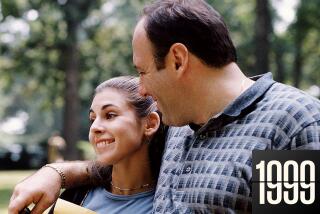Mamet’s ‘Buffalo’ Lumbers to Big Screen
- Share via
Despite their tough talk and rough characters, David Mamet’s plays are surprisingly delicate creations. On stage and film, his con men, lowlifes and shysters need to be expertly handled or their effectiveness evaporates. Which is what has happened in director Michael Corrente’s glum and unsatisfactory version of “American Buffalo.”
Initially produced on stage in 1975, “American Buffalo” is early Mamet, one of the first works that established him as a vivid and original voice in the American theater. His ability to create something close to poetry out of the macho bluster of hustlers and petty thieves won Mamet a Pulitzer Prize and all the respect and acclaim a playwright can aspire to.
Sometimes neglected in all that fuss is how large a part artifice plays in Mamet’s dialogue, how calculated his use of ritualistic repetition is and how self-conscious it can all seem in unskilled hands. For all their naturalistic touches, Mamet’s works have to be artificially energized to succeed.
But director Corrente, who debuted with the modest “Federal Hill,” treats “American Buffalo” as an example of kitchen-sink realism, a choice that inevitably leads to boredom and irritation. Even with Dustin Hoffman in the starring role.
A story of greed, betrayal and the absence of honor among thieves, “American Buffalo” (scripted by Mamet from his play) is a three-character piece set in a junk shop. Proprietor Donny Dubrow (“NYPD Blue’s” Dennis Franz) is a bear of little brain, but he knows when he’s been taken in a business transaction and the memory makes him furious.
Recently a neighborhood customer bought a rare American Buffalo nickel from Donny for considerably less than it was worth. In his fury at feeling ripped off, Donny is intent on stealing the nickel back, and he plans to use his young protege Bobby (Sean Nelson of “Fresh”) to do the job.
Enter Donny’s old buddy and poker partner Walter “Teach” Cole (Hoffman). With his long greasy hair and nervous, unshaven manner, Teach could be Ratso Rizzo’s older brother, only meaner and more manipulative. Determined to have a piece of the robbery, he begins to talk Donny out of using Bobby. “Am I so out of line on this?” he asks again and again before answering his own question. “This is business.”
Most of “American Buffalo” is a dialogue between Donny and Teach, antagonists who verbally dodge and weave and in general give each other a hard time as they wait for Fletcher, the Godot-like third man who’s supposed to show up to help with the heist. Questions of betrayal and trust, of who is lying about what, are everywhere, but this lifeless production gives us little reason to care about any of it.
Though he did not originate the part, during the 1980s Teach became something of a theatrical signature role for Al Pacino, who starred in productions in New York, London, Boston and elsewhere. But for reasons that lie buried underneath a tangle of competing egos and various claims to production rights, Hoffman, not Pacino, has ended up starring in this version.
While his performance can’t be faulted in terms of technique, neither Hoffman nor any of the other actors bring that extra level of energy to the proceedings that made Mamet’s “Glengarry Glen Ross,” for instance, involving on film.
Instead a kind of deadness settles over everything and these characters become as off-putting on screen as they would be in life. Lacking the passionate direction and incendiary acting that would enable the play to feel less stage-bound and more alive, “American Buffalo” lumbers to its conclusion, as awkward as the animal that lent the nickel its name.
* MPAA rating: R, for language. Times guidelines: the usual Mamet torrents of poetic obscenity.
(BEGIN TEXT OF INFOBOX / INFOGRAPHIC)
‘American Buffalo’
Dustin Hoffman: Walter “Teach” Cole
Dennis Franz: Donny Dubrow
Sean Nelson: Bobby
Presented in association with Capitol Films, produced in association with Punch Productions, released by the Samuel Goldwyn Company. Director Michael Corrente. Producer Gregory Mosher. Executive producer John Sloss. Screenplay David Mamet, based on his play. Cinematographer Richard Crudo. Editor Kate Sanford. Costumes Deborah Newhall. Music Thomas Newman. Production design Daniel Talpers. Set decorator Jessica Lanier. Running time: 1 hour, 28 minutes.
* Exclusively at the Cineplex Beverly Center, La Cienega at Beverly, West Hollywood, (310) 652-7760; Cineplex Odeon Broadway Cinemas, 1441 Third St. Promenade, (310) 458-1506; and Edwards Town Center, 3199 Park Center Drive, Costa Mesa, (714) 751-4184.
More to Read
The biggest entertainment stories
Get our big stories about Hollywood, film, television, music, arts, culture and more right in your inbox as soon as they publish.
You may occasionally receive promotional content from the Los Angeles Times.











